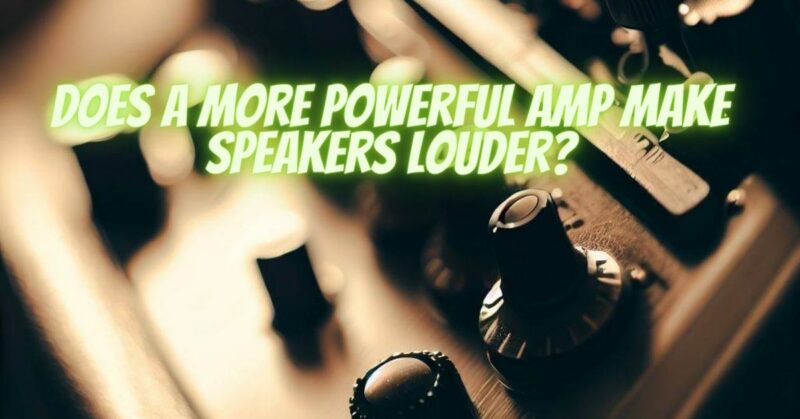The world of audio equipment can be daunting, especially for newcomers. One common question that often arises is whether a more powerful amplifier will make your speakers louder. It’s a valid concern because many believe that increasing the wattage of their amplifier will result in a significant boost in volume. However, the relationship between amplifier power and speaker loudness is more nuanced than it might seem. In this article, we’ll explore this relationship and help you understand the factors that truly affect the loudness of your speakers.
Understanding Amplifier Power
Before delving into the impact of amplifier power on speaker loudness, let’s clarify what amplifier power actually means. Amplifier power is usually measured in watts (W) and represents the amount of electrical power the amplifier can deliver to your speakers. This power is responsible for driving the speaker cones and producing sound.
The Role of Speaker Sensitivity
One crucial factor in determining how loud your speakers can get is their sensitivity, often expressed in decibels (dB). Speaker sensitivity refers to the efficiency with which a speaker converts electrical power into sound. A speaker with higher sensitivity will produce more sound for a given amount of amplifier power.
For example, a speaker with a sensitivity of 90 dB will produce more volume when connected to a 100-watt amplifier than a speaker with a sensitivity of 85 dB connected to the same amplifier. The 90 dB speaker will convert more of the amplifier’s power into sound output.
Amplifier Power and Speaker Loudness
Now, let’s address the main question: Does a more powerful amplifier make speakers louder? The short answer is yes, to a certain extent. A more powerful amplifier can indeed make your speakers louder, but there are limitations.
- The Law of Diminishing Returns: As you increase the amplifier power, you’ll notice that the increase in loudness isn’t linear. In fact, it follows the law of diminishing returns. This means that doubling your amplifier’s power won’t double the loudness. The perceived loudness increase is relatively small as you move up the power scale.
- Speaker Limitations: Your speakers have physical limitations. Pushing them beyond their capabilities, either in terms of amplifier power or volume levels, can lead to distortion, speaker damage, or even failure. It’s crucial to match the amplifier’s power output to the speaker’s handling capacity to avoid these issues.
- Listening Environment: The room in which you’re using your speakers also plays a significant role in perceived loudness. Room acoustics, furniture, and other factors can either enhance or dampen the sound, affecting how loud it appears to your ears.
- Hearing Sensitivity: Your personal hearing sensitivity is another factor. Different people have different hearing abilities, and what sounds loud to one person may not be perceived the same way by another.
In conclusion, a more powerful amplifier can make your speakers louder, but it’s not a straightforward relationship. Speaker sensitivity, the law of diminishing returns, speaker limitations, and your listening environment all play vital roles in determining the perceived loudness. It’s essential to strike a balance between amplifier power and speaker capabilities while considering your specific listening needs.
Before upgrading your amplifier, consider factors like speaker sensitivity, room acoustics, and your listening preferences. It’s often more important to focus on matching your amplifier and speakers appropriately and optimizing your listening environment for the best audio experience rather than merely chasing higher wattage for the sake of increased loudness.


